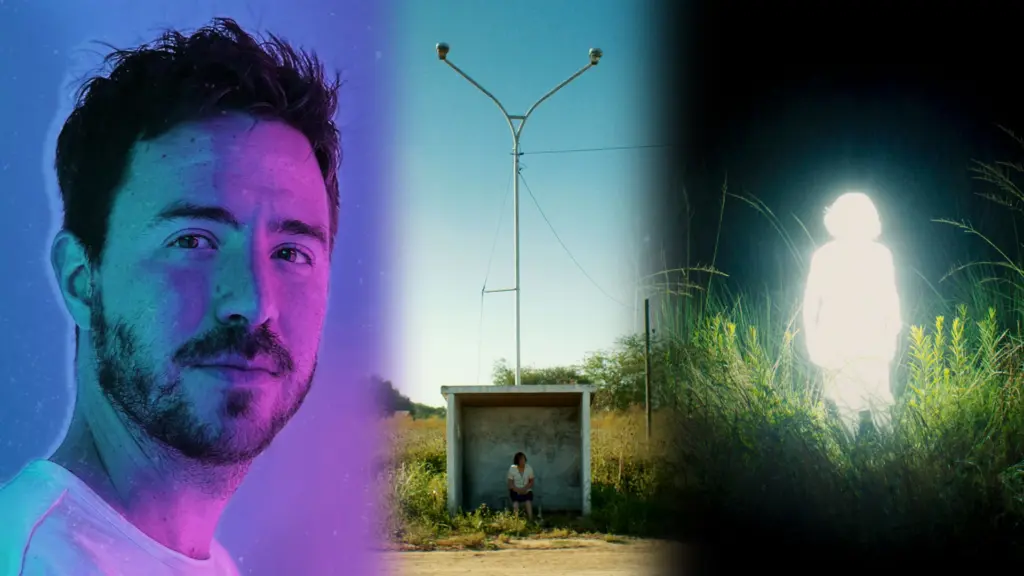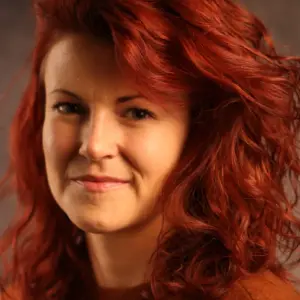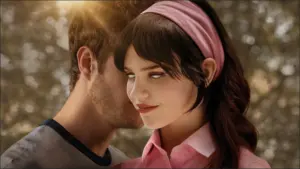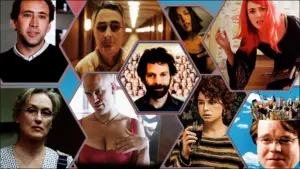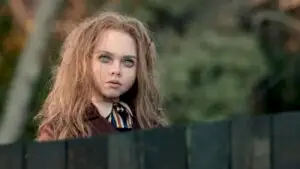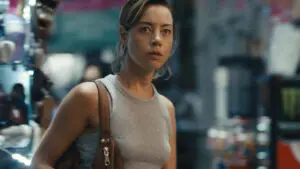If Gabriel García Márquez and Julio Cortázar wrote a movie together, it might look something like Chronicles of a Wandering Saint. A story about a pious woman named Rita who seizes an opportunity to scheme her way to sainthood, when the chance to stage a miracle presents itself, she doesn’t hesitate. After a strange turn of events results in Rita ultimately receiving everything she’s ever prayed for, the monkey’s paw curls another finger, and the repercussions of her greatest desires leave her wishing she had simply appreciated what she already had.
Written and directed by Tomás Gómez Bustillo, Chronicles marks the filmmaker’s first feature-length work after unleashing myriad short films over his career. An alumni of the AFI conservatory, Bustillo co-founded his production company, known as Plenty Good, shortly after receiving his MFA in Directing. Together, Bustillo and his associates have already experienced much success, with Chronicles receiving multiple Indie Spirit Award nominations, as well as the Adam Yauch Hörnblower Award at SXSW in 2023. Their production company is releasing their first English-speaking film starring Maisie Williams and Walton Goggins later this year.
Screenopolis had the chance to catch up with director Bustillo during the promotion of his directorial debut, which is set to hit theaters in New York at the IFC Center on June 28th, in Los Angeles on July 5th at the Lumiere Cinema, and in San Francisco on July 19th at the Roxy. In the interview, we discuss the filmmaker’s affinity for magical realism, working with the legend Mónica Villa, how he hopes his project will help diminish the polarization between highbrow arthouse indie movies and mega blockbusters, the director’s background in the church and why he considers Chronicles to be a ghost story that celebrates the living.
Kalyn Corrigan: You’ve made many short films over the years, but this is officially your feature-length directorial debut. What is it that you find so specifically special about this story that you deemed it worthy of a feature-length format?
Tomás Gómez Bustillo: I think it’s just the one that sticks with you. It’s a story that you feel like you need to make. I wish I had a really great reason to explain it rationally, as to why I needed to make this movie, but I don’t think I do. I think it’s just this image in my head that I couldn’t get out. It’s like a dream that haunts you over and over again, and you just need to put it out into the world somehow and see it realized to be able to purge it and move on. It’s not like I had like ten scripts, and I thought, I’m going to choose this one. This just kept coming to me and I needed to keep developing it, keep shaping it into a story. So, I think that was kind of the process. It was a little bit more amorphous.

Although undoubtedly devout, Rita’s quest for sainthood becomes skewed when she attempts to stage a fake miracle in order to achieve higher ranks in her church-led community. In your own words, how would you say that Rita’s crooked plan to achieve status in the church backfires on her in the most extreme way possible?
I always feel like when I’m writing a question, that I’m always asking myself, what is the worst thing that could happen to this person specifically? Like to this person, not just something that could happen to anyone, like losing a loved one or getting in some accident. What is specifically tailored to her pettiness or her human flaws? What would be the worst thing? This whole time, she just wants to be seen, and the moment when she’s finally seen, she’s invisible. That was the thing that I kept finding super fun, because I know I would feel that way as well. So, that’s one of the things that kept me going and developing that sequence.
You’ve said that Chronicles of a Wandering Saint is a ghost story that celebrates the living. What did you mean by that?
Well, I think so much of our culture in human history is based on what’s going to happen when we die. We have so many different interpretations of what that looks like. What I find fascinating is instead of focusing so much on what happens after we die – which I think ultimately for me, personally, is such a big uncertainty, like a question mark – It’s like why not instead focus on what happens when we’re here, and how to best use this time instead of argue about what happens in this hypothetical overtime that would be an afterlife. I think the idea is to put this ghost not in a different realm, but to put this ghost among us. To see what they could appreciate differently if they were on the other side. It’s a very Christmas Carol, very Scrooge kind of ordeal that she goes through.
How does your use of magical realism help celebrate the real human absurdity that lies underneath the surface of our perceived reality?
I’m a huge fan of magical realism. I grew up on magical realism. I really came of age reading that literature especially. So for me, I remember reading all of them, and at the end being like, wow, they’re just like my family. They’re just like my friends, you know? So, it wasn’t that I ended, like for example, reading One Hundred Years of Solitude and being like, wow, that’s crazy how this fantastical element happened, or that fantastical element happened. It felt like I had related more to the families, their stories, the humans than I had to the fantastical elements. I found that so refreshing in fiction, because so much of fiction is emphasizing the fantastical, the fictional, that a lot of the humanity remains unexplored within. So that’s what I was trying to do, is to focus more on that humanity than on the fictional, fantastical elements.
Most Argentinian films are polarized. There’s these highbrow art house films with a tiny audience and huge blockbusters, much in the way that American films are, I would say, as well. How are you hoping to use your film to explore a new path in Argentinian film and cinema?
This whole time while I was writing and directing it, I was like, I want this to be a movie that my grandma could watch, right? That was something that was very important to me – to make it accessible for people, so that it doesn’t feel like the director’s trying to prove that they’re smarter than the audience in some way, which I think is a silly way to engage with art. But what was very important to me was to also challenge the viewer and to just try things. Cinema is not something that’s written in stone, right? Like a form that has to be one way or another. We can still try things and see if they work. So, that playfulness was really important to me, to have it hopefully engage the viewer more. Something that feels refreshing and innovative, but also accessible, that was the goal.
What was it like working with Mónica Villa? What led you to choose her as the center of your directorial debut?
We were happy. We were fortunate that she chose to do this project, because she’s such a renowned actor and she’s a legend in Argentina. She’s absolutely iconic. I honestly feel like as a first time feature filmmaker, it was a huge part of my film education to be able to work with her, because I could really see what an actor brings to a film. An actor is not just fulfilling the director’s notes or intentions, or even acting the scene as it’s written, they’re bringing life to the character, and that’s such an intangible thing that you don’t understand until you start to see their process. She was generous enough to let me into that process, and we became involved together in that process. Honestly, I couldn’t be more grateful. By the end, we were hugging each other and crying. It was such a transformative experience for the both of us. I think that I can only speak for myself, but it was certainly transformative for me. I’m eternally grateful that she chose to be in this movie.

It comes across as a very personal film. Was there anything in particular from your real life that you wanted to include in this story?
Well, not particularly because, you know, I haven’t yet died and become a ghost and been able to walk around and see what my friends think of me, what my family members really think of me and whatnot. It really is more like wish and anxiety fulfillment for myself than it is autobiographical. It’s more of like, man, it would freak me out if this happened to me. It would totally be hilarious if this happened to me, because that’s my biggest fear, you know? These were the explorations that I was doing and trying to put myself in for these characters, but putting a lot of my own insecurities and fears and wishes in them as well.
Given your background in the church, it definitely seems like it’s coming from a very authentic place.
Oh yeah, I also spent a lot of time in that specific town as a Catholic missionary. There’s a lot of that world that is very personal to me, just because I have so much affection for it.
Talk a little bit about your production company, Plenty Good, that you co-founded shortly after graduating with your MFA in Directing at the AFI conservatory.
It started as just a friend group, and we were having picnics and barbecues, and it eventually evolved into a production company. That’s really because we’ve always supported each other through the development process, which can be very long, and workshopped all of our scripts a lot and in depth. I think that workshop mentality has been what has helped us grow a lot and be able to nurture our stories, take them to the places where they need to go. Most importantly, that’s a safe space where we can challenge ourselves. We have another movie that’s coming out very soon, and that will be our first English language feature film. It’s directed by a dear friend, Samir Oliveros, and it has an incredibly stacked cast that I hope we’ll be hearing a lot about in the next few months. We have a lot of stuff coming up. But most importantly, it’s just a group of friends who support each other’s voices and challenges each other.
Oh, that’s great. I can’t wait to see it. Can you tell me what it’s called, or is it too early?
Well, it might be a little bit early. It has a working title called Press Your Luck, but I think we might be changing the title. So, it might end up being called something different. I don’t know yet where it will land, but it’s a game show kind of heist story, and it stars Paul Walter Hauser. I’m sure it’ll start popping up in your peripherals hopefully soon.
Awesome, I can’t wait to check it out. So, now that you’ve reached the goal line, you’ve completed your directorial debut, and it’s a wonderful film. What would you say you’ve learned?
Oh man, I don’t know. I think I’ve learned a lot of things about myself. I think that it’s really not just about me, that the whole process, it’s about the film. I had this incredible teacher who always said that my job as a director is to listen to the film and not to talk over it. And this process has really, really shown me that that’s true. Sometimes I’m my own worst enemy, but I have to ultimately prioritize where the movie wants to go, and not what I want the movie to be. There’s been so many lessons that I’ve learned along those lines, that I can hopefully take away for the next film.

